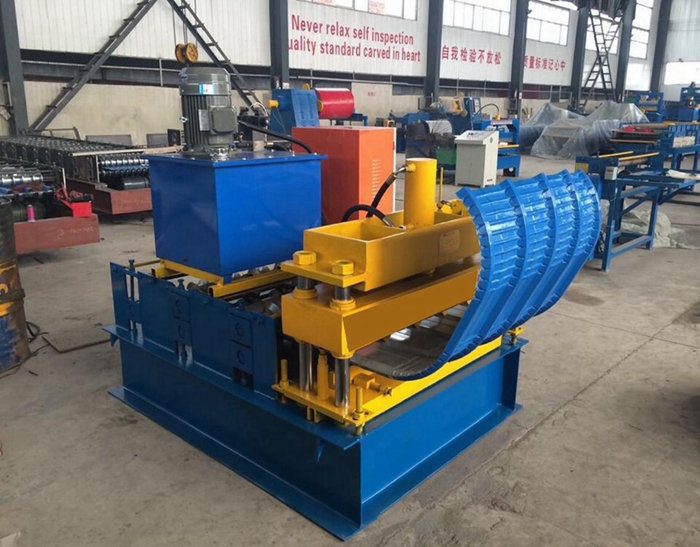Advanced Custom Shaped Roll Forming Equipment for Precision Metal Fabrication
The Special Shape Roll Forming Machine Innovations in Metal Fabrication
In the ever-evolving world of manufacturing, the demand for specialized and intricate components has surged, particularly in industries such as construction, automotive, and aerospace. Among the various techniques employed to meet these demands, the special shape roll forming machine has emerged as a crucial tool. This innovative machinery allows for the creation of complex profiles and shapes, enhancing production efficiency and product reliability.
Understanding Roll Forming
Roll forming is a continuous bending process where a long strip of metal is gradually shaped into a desired cross-section by passing it through a series of rollers. This method is particularly advantageous for producing long lengths of uniform parts with precise dimensions. Traditional roll forming typically produces simple shapes such as C-sections or U-channels. However, as modern applications require more complex designs, manufacturers have turned to special shape roll forming machines.
Features of Special Shape Roll Forming Machines
Special shape roll forming machines are engineered specifically to handle intricate profiles that standard rollers cannot produce. These machines can create a diverse range of shapes, including elliptical, angular, and asymmetrical designs. The flexibility of special shape roll forming machines is derived from a few key features
1. Customizable Tooling One of the primary advantages is the ability to customize the tooling according to specific product requirements. Manufacturers can design rollers that can produce a variety of shapes in one continuous process, reducing production times and material waste.
2. Precision Control Modern machines often incorporate advanced technology that allows for precise control over the forming process. This reduces the margin for error, ensuring that each component meets the exact specifications required.
3. High Throughput These machines are designed for efficiency, capable of processing large volumes of material in a short time. This is especially beneficial for bulk production runs, where consistent quality and speed are paramount.
4. Wide Range of Materials Special shape roll forming machines can work with a variety of materials, including steel, aluminum, and even some plastics. This versatility expands the applicability of the technology across multiple industries.
Applications of Special Shape Roll Forming Machines
special shape roll forming machine

The potential applications for special shape roll forming machines are vast. In the construction industry, they are often used to produce roofing panels, wall systems, and structural components that require specific profiles to meet architectural design criteria. The automotive sector benefits from these machines by producing tailored frame components and body parts that enhance vehicle performance and safety.
Moreover, the aerospace industry utilizes rapid prototyping with special shape roll forming to develop lightweight yet strong components, an essential requirement given the industry’s stringent regulations and performance expectations. Additionally, these machines are integral in producing custom metal fissures used in various decorative and functional designs in the manufacturing of furniture and fixtures.
Benefits of Using Special Shape Roll Forming Machines
Adopting special shape roll forming machines offers several benefits
- Cost Efficiency While the initial investment may be considerable, the overall reduction in material wastage and labor costs makes the long-term financial implications favorable.
- Improved Structural Integrity The continuous bending process minimizes potential weak points in the metal, thereby enhancing the structural integrity of the finished product.
- Versatility The ability to produce various shapes and sizes from the same machine enhances production flexibility, allowing manufacturers to quickly adapt to changing market demands.
- Reduced Lead Time With the capability to produce complex shapes in one run, manufacturers can significantly reduce lead times, getting products to market faster.
Conclusion
As industries continue to evolve and demand more intricate designs and faster production times, the special shape roll forming machine stands out as a formidable solution. By integrating innovative technologies and customizable features, these machines not only meet the standards of modern manufacturing but also set new benchmarks for efficiency and quality. Embracing this technology not only aids manufacturers in staying competitive but also opens doors to new opportunities in product development and design. As we look towards the future, the special shape roll forming machine will undoubtedly play a significant role in shaping the landscape of metal fabrication.
-
Roof Panel Machines: Buying Guide, Types, and PricingNewsJul.04, 2025
-
Purlin Machines: Types, Features, and Pricing GuideNewsJul.04, 2025
-
Metal Embossing Machines: Types, Applications, and Buying GuideNewsJul.04, 2025
-
Gutter Machines: Features, Types, and Cost BreakdownNewsJul.04, 2025
-
Cut to Length Line: Overview, Equipment, and Buying GuideNewsJul.04, 2025
-
Auto Stacker: Features, Applications, and Cost BreakdownNewsJul.04, 2025
-
Top Drywall Profile Machine Models for SaleNewsJun.05, 2025








